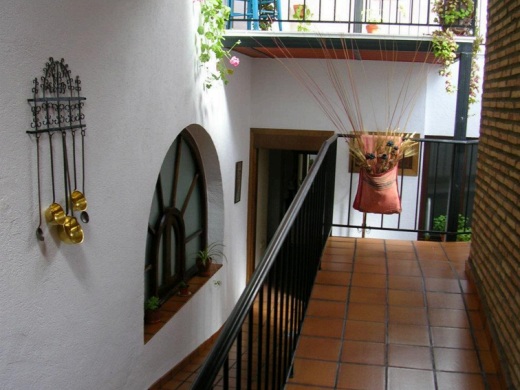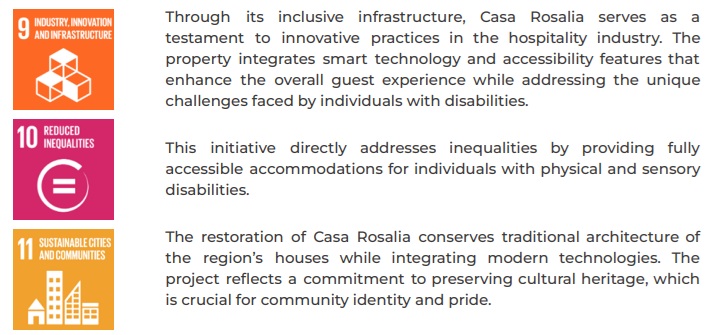EDI Best Practice from Spain: Casa Rural Rosalia – Rural Inclusion done right
Casa Rural Rosalia is an accessible, automated rural accommodation designed to host individuals with severe mobility challenges. This initiative is led by a micro-enterprise dedicated to sustainability and inclusion, emphasising environmental stewardship and ensuring accessibility without physical or social barriers. The accommodation currently holds 2 environmental management labels, including the Andalusian Natural Park Brand since March 2009 and the Certificate of Accession to the European Charter for Sustainable Tourism in May 2010.
Context
Casa Rosalia, launched in 2001, was the first fully accessible accommodation in Andalusia and one of the first in Spain. This “intelligent” property was the product of a restored century-old farmers’ house, designed to host tourists with physical and sensory disabilities. The innovative project was inspired by the founder’s personal physical disability which requires the use of a wheelchair. Casa Rosalia promotes inclusive tourism, offering marginalised individuals the opportunity to comfortably enjoy Southern Spain’s attractions.
Additionally, Casa Rosalia aims to support tourism development in Cardeña, Cordoba. The founder operates as a self-employed individual, occasionally hiring staff for cleaning and maintenance.
Implementation
The services of an architect were engaged to oversee the building’s restoration. The renovation incorporated various assistive technologies such as motion sensors, automated light switches and door openings, doors, blinds, and windows of specialised widths, low-height beds as well as the installation of a crane and shower chair. Additionally, the design included ramps for outdoor access. Attention was also given to preserving the building’s Andalusian rustic architecture. The restoration plans were approved, and the renovation was executed. The acceptance of the product into the market was a gradual process as the promotion of rural properties was limited at the time. Over the years, Casa Rosalia’s reputation was solidified within its target market. The project’s success facilitated the development of other inclusive public initiatives in the region, such as a network of accessible trails and an astronomical observatory. Today, Cardeña is a leading destination for individuals with disabilities.
Enabling Factors
One key enabling factor for this inclusive tourism initiative was the founder’s personal experience with severe mobility challenges. Their specialised training and firsthand understanding were essential for designing the necessary improvements to ensure Casa Rosalia was fully accessible such as ensuring a barrier-free access to all rooms and the integration of home automation. Additionally, the founder’s expertise in tourism management, built over 30 years as a tourism councillor in Cardeña, provided valuable insights into tourism planning and development, contributing to the success of this initiative. Its long term-success and influence paved the way for greater EDI initiatives in Andalusia, setting a precedent for future accessible accommodations.
Barriers
When Casa Rosalia was being repurposed in the early 2000s, it faced several limitations. First, there was a lack of specific regulations, technology, and architectural and construction expertise as accessibility and home automation were still underdeveloped. An additional constraining factor was overcoming lack of trust and visibility of the property at the beginning. Promotion through online platforms was not widely utilised at the time, and awareness relied heavily on word-of-mouth. Despite overcoming these barriers, Casa Rosalia still faces psychological and social obstacles that individuals with disabilities often experience. This demographic often faces travel challenges, leading to negative experiences and reduced tourism engagement.
Impact on the Organisation
The implementation of Casa Rosalia as a fully accessible rural accommodation has led to a notable improvement in customer and user satisfaction. This has been achieved by enabling individuals with varying levels of physical and sensory disabilities to enjoy a new destination with a high level of comfort. Furthermore, the excellent ratings for both the accommodation and destination have positioned this tourism offer as one of the best for people with disabilities in the country.
Quotes
‘Casa Rosalía’s pioneering approach to accessible accommodation in Andalucía has paved the way for greater equality, diversity and inclusion. The establishment of inclusive holidays for individuals with varying physical and sensory disabilities has been a significant step forward.’
Lessons Learned
Casa Rosalia demonstrates that inclusive tourism is achievable through thoughtful consideration of the challenges faced by individuals with disabilities. Improvements in architecture and home automation have helped overcome accessibility barriers. This offers the hospitality industry the potential for progress to enhance the tourism experience for everyone.
Future Plans
Casa Rosalia will continue with its operations. In addition, other private and public projects are being implemented in the region to continue to expand EDI practices through future tourism development strategies.
Link with UN Sustainable Development Goals
Read the full PANTOUR EDI Report here.





No Comments